
Jordan Journal of Civil Engineering
Scope & Guideline
Building Knowledge, Shaping Futures
Introduction
Aims and Scopes
- Infrastructure Development and Management:
The journal explores various aspects of infrastructure, including the design, management, and maintenance of transportation systems, buildings, and urban environments, reflecting the need for sustainable and efficient infrastructure solutions. - Material Science and Engineering:
Research on the properties, performance, and innovative applications of construction materials, including concrete, asphalt, and recycled materials, is a core focus, highlighting advancements in material technology for improved durability and sustainability. - Geotechnical Engineering and Soil Mechanics:
The journal publishes studies on soil behavior, ground improvement techniques, and geotechnical analysis, addressing challenges in construction and environmental sustainability in various soil conditions. - Environmental Engineering and Water Resources:
Papers related to water quality assessment, flood management, and environmental impacts of construction practices are prevalent, indicating a commitment to addressing pressing environmental issues within civil engineering. - Traffic and Transportation Engineering:
Research on traffic safety, noise modeling, and transportation systems optimization reflects the journal's commitment to enhancing urban mobility and safety for road users. - Structural Engineering and Analysis:
The journal features studies on the performance, design, and analysis of structures under various loading conditions, emphasizing innovative design methods and the use of advanced materials.
Trending and Emerging
- Sustainable and Eco-friendly Materials:
There is a notable increase in research focusing on the use of recycled materials and sustainable construction practices, reflecting a global push towards environmentally responsible engineering solutions. - Advanced Computational Techniques:
The application of machine learning, artificial intelligence, and deep learning for predictive modeling and analysis in civil engineering is on the rise, showcasing the integration of technology in engineering practices. - Risk Assessment and Management in Construction:
Emerging themes in risk analysis, particularly concerning environmental and safety risks in construction projects, highlight the importance of proactive management strategies in complex construction environments. - Smart Infrastructure and IoT Applications:
Research exploring the integration of smart technologies and the Internet of Things (IoT) in infrastructure management is gaining momentum, indicating a shift towards intelligent and responsive urban systems. - Climate Resilience and Adaptation Strategies:
Increasing focus on climate change impacts and the development of adaptive strategies for infrastructure resilience demonstrates a growing recognition of environmental challenges facing civil engineering.
Declining or Waning
- Traditional Construction Practices:
Research focused on conventional construction methods and materials has decreased, as there is a growing shift towards innovative and sustainable construction techniques. - Basic Hydraulics and Fluid Mechanics:
While hydraulics remains a critical area, the focus on basic principles and traditional methods has waned, with more emphasis now placed on advanced modeling and simulation techniques. - Static Structural Analysis without Modern Methods:
The decrease in studies employing classical static analysis methods suggests a trend towards more dynamic and complex analyses using computational methods and software. - Urban Planning without Technological Integration:
Research that does not incorporate modern technology, such as GIS or data analytics in urban planning, is becoming less common, reflecting the need for data-driven decision-making in urban development.
Similar Journals
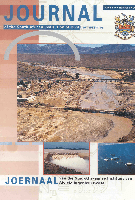
Journal of the South African Institution of Civil Engineering
Empowering engineers with cutting-edge research.Journal of the South African Institution of Civil Engineering (ISSN: 1021-2019) is a distinguished open-access publication dedicated to advancing the field of civil engineering in South Africa and beyond. Established by the South African Institution of Civil Engineering (SAICE) and South African Institute of Steel Construction (SAISI), it serves as a critical platform for sharing research, case studies, and industry developments. The journal has been openly accessible since 2015, ensuring broader dissemination of knowledge among researchers, professionals, and students alike. Although it currently holds a Q4 ranking in Civil and Structural Engineering and is positioned within the lower percentiles in Scopus rankings, its commitment to fostering growth in the engineering sector remains strong. Covering various topics from structural design to innovative construction methodologies, the journal invites contributions that push the boundaries of current practices and methodologies. This publication is essential for those invested in sustainable engineering solutions, aiming to collaborate and contribute towards the evolution of civil engineering standards in South Africa.

Teknik Dergi
Pioneering Insights for Structural ExcellenceTeknik Dergi is a key academic journal published by the Turkish Chamber of Civil Engineers, focusing on the critical fields of Building and Construction as well as Civil and Structural Engineering. Established in Turkey, this journal serves as a vital platform for researchers, practitioners, and students to disseminate innovative findings and advancements within these disciplines. Although its coverage in databases like Scopus has been discontinued since 2022, Teknik Dergi remains a respected resource for its historical contributions, with a record of publication spanning from 1990 to 1998 and then from 2002 to 2022. The journal currently holds a Q4 categorization in both its primary fields, ranking within the 30th and 25th percentiles respectively. Authors and readers can access articles exploring practical applications and theoretical foundations, making it a valuable asset for those engaged in the rapidly evolving landscape of civil engineering. Open Access options are also available, allowing for broader dissemination and engagement with its published work.
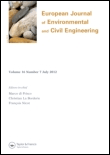
European Journal of Environmental and Civil Engineering
Transforming Knowledge into Action for a Sustainable Built EnvironmentThe European Journal of Environmental and Civil Engineering, published by Taylor & Francis Ltd, is a prestigious peer-reviewed journal that serves as a vital platform for advancing knowledge in the fields of Civil and Structural Engineering as well as Environmental Engineering. With an impressive impact factor and categorized in the Q2 quartile for both engineering fields, this journal occupies a significant position in the scholarly community. Its focused scope encompasses innovative research, case studies, and practical applications that address contemporary environmental and infrastructural challenges. Researchers, professionals, and students alike benefit from the journal's commitment to high-quality discourse, as evidenced by its Scopus rankings, which place it in the top 30% in Civil and Structural Engineering and the top 40% in Environmental Engineering. Through the publication of cutting-edge studies and a commitment to fostering interdisciplinary dialogue, the European Journal of Environmental and Civil Engineering remains an essential resource for those dedicated to improving our built environment and safeguarding our natural resources.
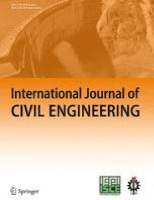
International Journal of Civil Engineering
Connecting Theory to Practice in Civil Engineering ResearchThe International Journal of Civil Engineering, published by Springer International Publishing AG, is a premier platform dedicated to advancing the field of civil engineering. With a notable impact factor and a strong reputation reflected in its Q2 quartile rankings in both Civil and Structural Engineering as well as Geotechnical Engineering and Engineering Geology, this journal facilitates the dissemination of high-quality research from 2009 through 2024. Researchers and professionals can access cutting-edge studies and innovative practices that address contemporary challenges in civil engineering, such as sustainable infrastructure development, environmental impacts, and advanced material technologies. Situated in Switzerland, the International Journal of Civil Engineering emphasizes the critical interplay between theory and application, making it an essential resource for students, academics, and industry leaders seeking to stay at the forefront of their disciplines.

Periodica Polytechnica-Civil Engineering
Elevating Engineering Standards with Rigorous ResearchPeriodica Polytechnica-Civil Engineering is a prestigious journal published by the Budapest University of Technology and Economics, dedicated to advancing the field of civil engineering through high-quality research and innovative practices. Established in 1972, the journal has transitioned through various phases of publication and now spans an expansive range of topics within civil and structural engineering, geotechnical engineering, and engineering geology. With an impact factor indicating its growing influence and a commendable placement in the Q3 quartile according to the latest 2023 metrics, it recognizes contributions that bridge theoretical advancements with practical applications. While currently not open access, the journal remains a vital resource for researchers, professionals, and students seeking to stay abreast of the latest developments in engineering design, construction techniques, and geotechnical innovations. The continuous publication of significant research after almost five decades underscores its commitment to disseminating knowledge crucial for the world’s infrastructure challenges, making it an essential reference point within the engineering community.

KSCE Journal of Civil Engineering
Connecting Scholars to Shape Tomorrow's InfrastructureKSCE Journal of Civil Engineering is a prestigious international publication dedicated to advancing the field of civil engineering. Established by the Korean Society of Civil Engineers (KSCE), this journal serves as a vital platform for high-quality research in the discipline, showcasing innovative methodologies, case studies, and critical analyses pertinent to civil and structural engineering. With an impact factor placing it in the Q2 category of civil engineering journals for 2023 and a solid Scopus rank of #141 out of 379, it reflects the significant contributions of its authors and the growing recognition of its published works. KSCE Journal of Civil Engineering, based in Germany and easily accessible to the global research community, is committed to disseminating knowledge with rigor and integrity, encouraging both emerging scholars and seasoned experts to contribute to the evolving discourse in civil engineering. With a convergence period from 2009 to 2024, the journal continues to uphold its mission of fostering innovation and excellence in engineering practice.
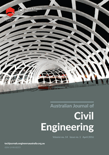
Australian Journal of Civil Engineering
Advancing the Future of Civil EngineeringThe Australian Journal of Civil Engineering, published by Taylor & Francis Ltd, stands as a pivotal platform within the field of civil and structural engineering. With an ISSN of 1448-8353 and an E-ISSN of 2204-2245, this journal consistently delivers high-quality research and innovative practices from both established and emerging scholars in the discipline. Recognized in the Q2 category for Civil and Structural Engineering in 2023, it holds a respectable position, ranking 146 out of 379 within its field according to Scopus, which places it in the 61st percentile. Converging valuable insights from 2011 through 2024, the journal encompasses a broad scope of topics, including sustainable infrastructure, innovative materials, and advanced construction techniques, thereby addressing contemporary challenges faced by engineering professionals. Though it is a traditional publication without open access options, the quality of the research featured ensures that it remains an essential resource for academics, practitioners, and students striving to enhance their knowledge and contribute to the dynamic field of civil engineering.

Transportation Infrastructure Geotechnology
Innovating Geotechnical Solutions for Sustainable Transport.Transportation Infrastructure Geotechnology, an esteemed journal published by SpringerNature, serves as a vital platform in the fields of Civil and Structural Engineering, Environmental Engineering, Geotechnical Engineering, and Transportation. Established in 2014 and spanning a decade of significant scientific discourse, this journal has gained recognition for its robust contribution to the understanding of the interplay between geotechnical processes and transportation infrastructure. With an impactful Q2 ranking in multiple categories—including Civil and Structural Engineering and Environmental Engineering—it emphasizes innovative research and practical applications globally. Researchers and professionals can explore critical topics that influence infrastructure sustainability, safety, and efficiency. Although it operates under a subscription model, its affiliation with SpringerNature ensures rigorous peer-review and high-quality publications, making it an indispensable resource for academics and industry experts alike.
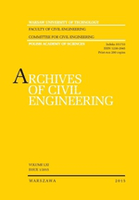
Archives of Civil Engineering
Championing Excellence in Structural InnovationArchives of Civil Engineering is a premier academic journal published by POLISH ACAD SCIENCES, dedicated to advancing the field of civil and structural engineering. Established in 1996, this open-access journal has been pivotal in disseminating high-quality research and innovation in engineering practices, particularly since adopting open access in 2010. With an ISSN of 1230-2945 and E-ISSN of 2300-3103, it enjoys a notable reputation, currently ranked in Q3 of the Civil and Structural Engineering category for 2023, reflecting its considerable contribution to scholarly content in the discipline. The journal caters to a diverse audience of researchers, professionals, and students, providing them with a platform to share and access essential findings. Its commitment to high academic standards is underscored by its ranking in Scopus, where it stands at Rank #265/379. Located in Warsaw, Poland, the journal aims to promote international collaboration and foster knowledge exchange in civil engineering, making it an indispensable resource for anyone involved in this dynamic field.

Innovative Infrastructure Solutions
Transforming Ideas into Innovative Infrastructure Solutions.Innovative Infrastructure Solutions is a leading academic journal published by Springer International Publishing AG, focusing on pioneering advancements in the fields of building and construction, civil and structural engineering, and environmental engineering. With an impact factor that reflects its significant role in the academic community, this journal serves as a vital platform for researchers, professionals, and students to disseminate groundbreaking studies and novel methodologies spanning diverse engineering disciplines. Since its inception in 2016, Innovative Infrastructure Solutions has steadily positioned itself within the Q2 category across several fields, including geotechnical engineering and engineering geology, as recognized in the 2023 quartiles. This reputable journal, accessible from Switzerland, not only emphasizes collaboration and knowledge exchange but also empowers innovators in infrastructure development globally. Whether you're contributing to a research project or seeking the latest findings, Innovative Infrastructure Solutions remains essential for anyone invested in advancing sustainable infrastructure solutions.